London University: Intercultural Competence Report for Business
VerifiedAdded on 2023/01/17
|8
|2277
|44
Report
AI Summary
This report delves into the critical topic of intercultural competence within a business context. It begins with personal cultural autobiographies, providing insights into individual backgrounds and values. The report then examines a co-worker's cultural background, highlighting similarities and differences in values and beliefs. It applies Hofstede's cultural dimension theory to compare the two cultures, analyzing factors such as power distance, individualism, uncertainty avoidance, masculinity, and indulgence. Finally, the report utilizes a culture alignment framework, focusing on interdependence/independence and flexibility/stability, to further analyze the impact of culture on individual behavior and business operations. The analysis aims to provide a comprehensive understanding of how cultural differences can influence communication, decision-making, and overall business success. The report concludes by summarizing the key findings and emphasizing the importance of intercultural understanding in a globalized business environment.
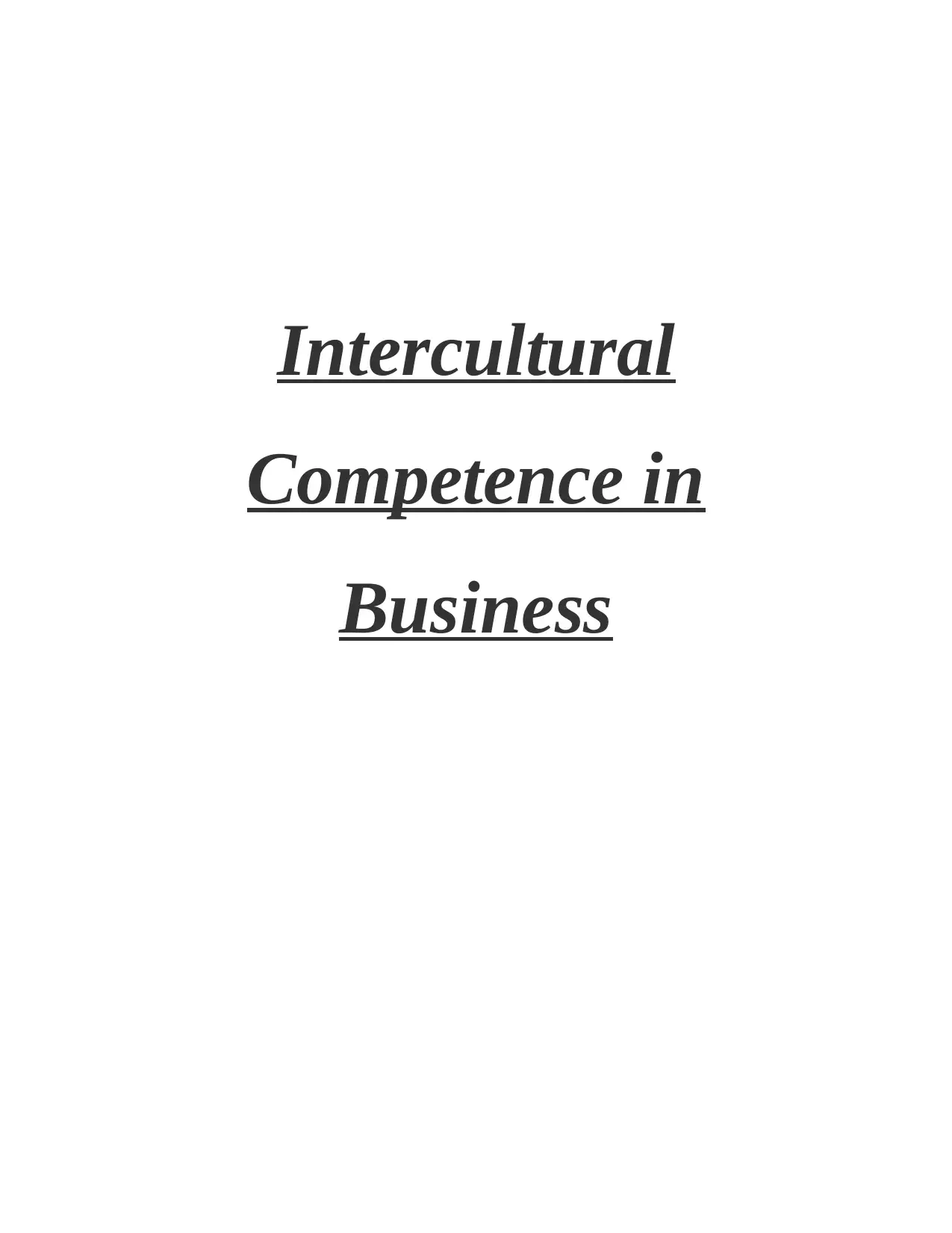
Intercultural
Competence in
Business
Competence in
Business
Paraphrase This Document
Need a fresh take? Get an instant paraphrase of this document with our AI Paraphraser
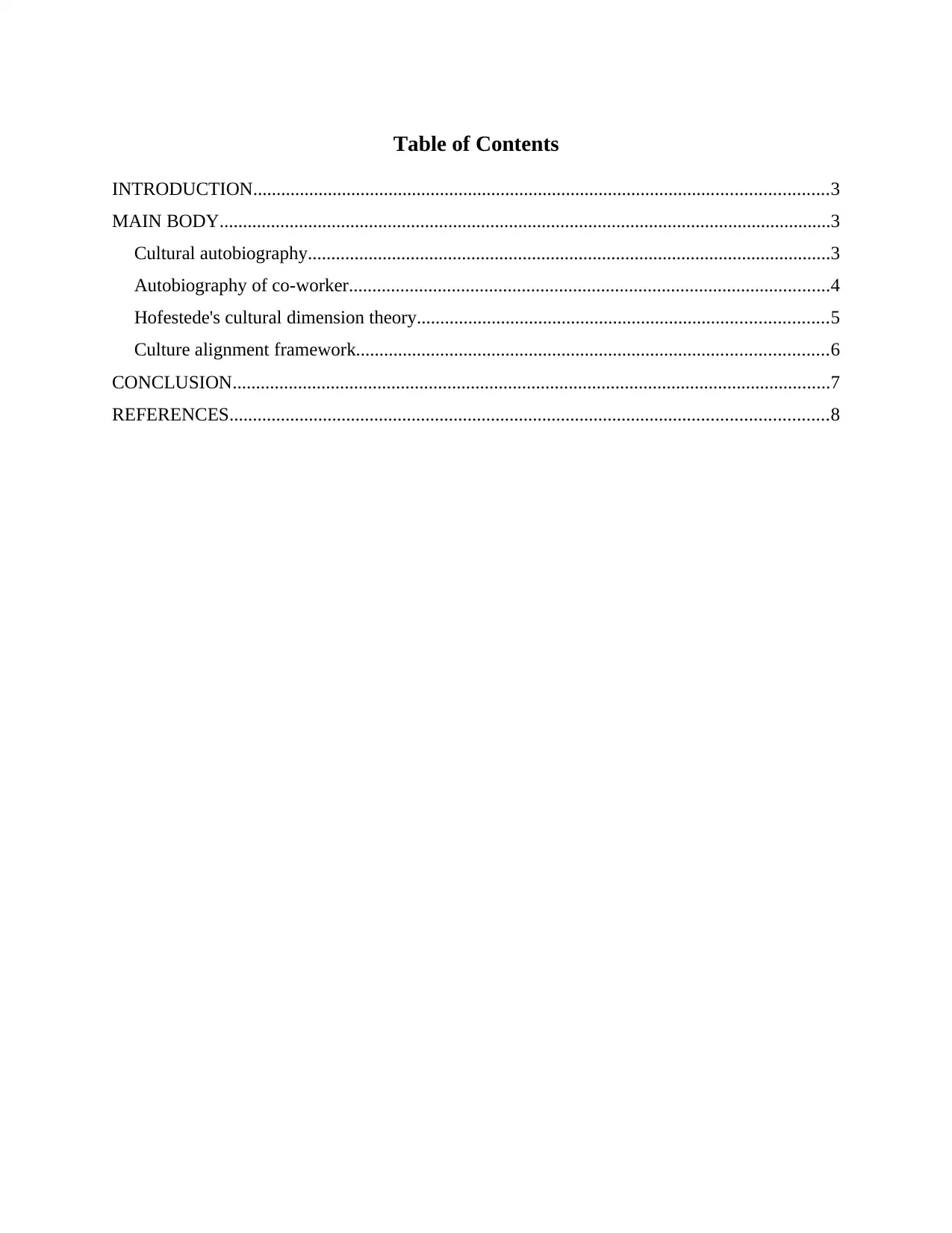
Table of Contents
INTRODUCTION...........................................................................................................................3
MAIN BODY...................................................................................................................................3
Cultural autobiography................................................................................................................3
Autobiography of co-worker.......................................................................................................4
Hofestede's cultural dimension theory........................................................................................5
Culture alignment framework.....................................................................................................6
CONCLUSION................................................................................................................................7
REFERENCES................................................................................................................................8
INTRODUCTION...........................................................................................................................3
MAIN BODY...................................................................................................................................3
Cultural autobiography................................................................................................................3
Autobiography of co-worker.......................................................................................................4
Hofestede's cultural dimension theory........................................................................................5
Culture alignment framework.....................................................................................................6
CONCLUSION................................................................................................................................7
REFERENCES................................................................................................................................8
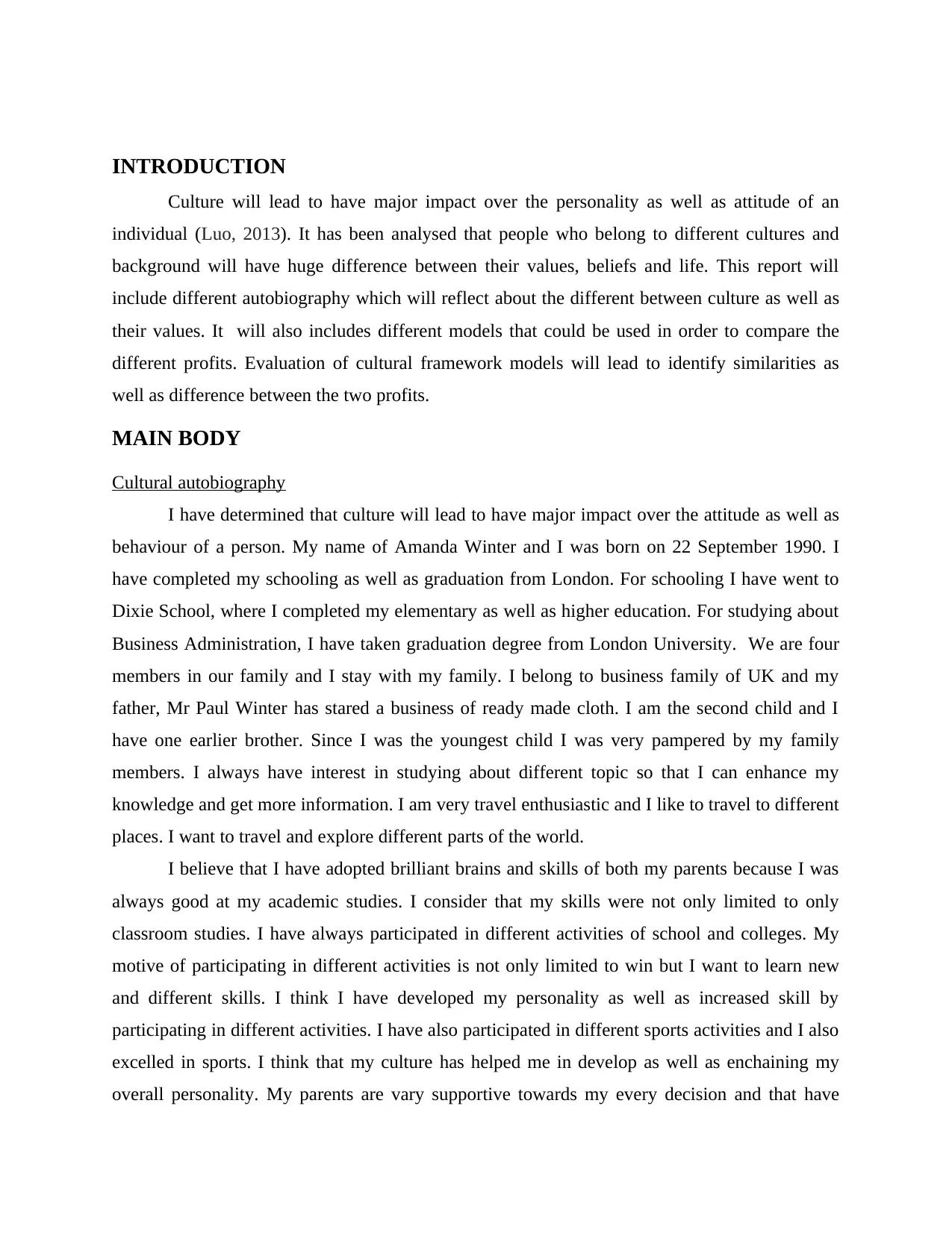
INTRODUCTION
Culture will lead to have major impact over the personality as well as attitude of an
individual (Luo, 2013). It has been analysed that people who belong to different cultures and
background will have huge difference between their values, beliefs and life. This report will
include different autobiography which will reflect about the different between culture as well as
their values. It will also includes different models that could be used in order to compare the
different profits. Evaluation of cultural framework models will lead to identify similarities as
well as difference between the two profits.
MAIN BODY
Cultural autobiography
I have determined that culture will lead to have major impact over the attitude as well as
behaviour of a person. My name of Amanda Winter and I was born on 22 September 1990. I
have completed my schooling as well as graduation from London. For schooling I have went to
Dixie School, where I completed my elementary as well as higher education. For studying about
Business Administration, I have taken graduation degree from London University. We are four
members in our family and I stay with my family. I belong to business family of UK and my
father, Mr Paul Winter has stared a business of ready made cloth. I am the second child and I
have one earlier brother. Since I was the youngest child I was very pampered by my family
members. I always have interest in studying about different topic so that I can enhance my
knowledge and get more information. I am very travel enthusiastic and I like to travel to different
places. I want to travel and explore different parts of the world.
I believe that I have adopted brilliant brains and skills of both my parents because I was
always good at my academic studies. I consider that my skills were not only limited to only
classroom studies. I have always participated in different activities of school and colleges. My
motive of participating in different activities is not only limited to win but I want to learn new
and different skills. I think I have developed my personality as well as increased skill by
participating in different activities. I have also participated in different sports activities and I also
excelled in sports. I think that my culture has helped me in develop as well as enchaining my
overall personality. My parents are vary supportive towards my every decision and that have
Culture will lead to have major impact over the personality as well as attitude of an
individual (Luo, 2013). It has been analysed that people who belong to different cultures and
background will have huge difference between their values, beliefs and life. This report will
include different autobiography which will reflect about the different between culture as well as
their values. It will also includes different models that could be used in order to compare the
different profits. Evaluation of cultural framework models will lead to identify similarities as
well as difference between the two profits.
MAIN BODY
Cultural autobiography
I have determined that culture will lead to have major impact over the attitude as well as
behaviour of a person. My name of Amanda Winter and I was born on 22 September 1990. I
have completed my schooling as well as graduation from London. For schooling I have went to
Dixie School, where I completed my elementary as well as higher education. For studying about
Business Administration, I have taken graduation degree from London University. We are four
members in our family and I stay with my family. I belong to business family of UK and my
father, Mr Paul Winter has stared a business of ready made cloth. I am the second child and I
have one earlier brother. Since I was the youngest child I was very pampered by my family
members. I always have interest in studying about different topic so that I can enhance my
knowledge and get more information. I am very travel enthusiastic and I like to travel to different
places. I want to travel and explore different parts of the world.
I believe that I have adopted brilliant brains and skills of both my parents because I was
always good at my academic studies. I consider that my skills were not only limited to only
classroom studies. I have always participated in different activities of school and colleges. My
motive of participating in different activities is not only limited to win but I want to learn new
and different skills. I think I have developed my personality as well as increased skill by
participating in different activities. I have also participated in different sports activities and I also
excelled in sports. I think that my culture has helped me in develop as well as enchaining my
overall personality. My parents are vary supportive towards my every decision and that have
⊘ This is a preview!⊘
Do you want full access?
Subscribe today to unlock all pages.

Trusted by 1+ million students worldwide
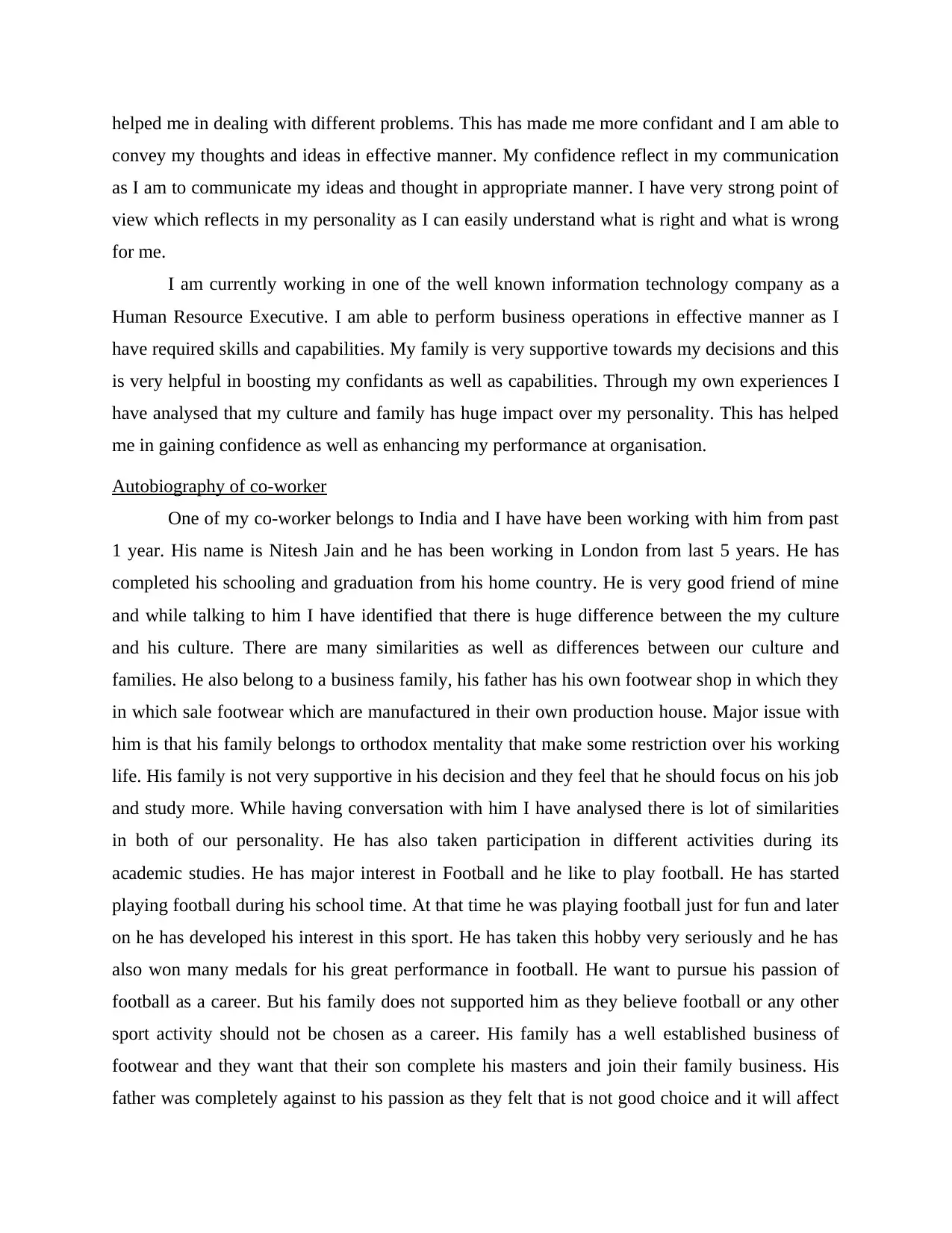
helped me in dealing with different problems. This has made me more confidant and I am able to
convey my thoughts and ideas in effective manner. My confidence reflect in my communication
as I am to communicate my ideas and thought in appropriate manner. I have very strong point of
view which reflects in my personality as I can easily understand what is right and what is wrong
for me.
I am currently working in one of the well known information technology company as a
Human Resource Executive. I am able to perform business operations in effective manner as I
have required skills and capabilities. My family is very supportive towards my decisions and this
is very helpful in boosting my confidants as well as capabilities. Through my own experiences I
have analysed that my culture and family has huge impact over my personality. This has helped
me in gaining confidence as well as enhancing my performance at organisation.
Autobiography of co-worker
One of my co-worker belongs to India and I have have been working with him from past
1 year. His name is Nitesh Jain and he has been working in London from last 5 years. He has
completed his schooling and graduation from his home country. He is very good friend of mine
and while talking to him I have identified that there is huge difference between the my culture
and his culture. There are many similarities as well as differences between our culture and
families. He also belong to a business family, his father has his own footwear shop in which they
in which sale footwear which are manufactured in their own production house. Major issue with
him is that his family belongs to orthodox mentality that make some restriction over his working
life. His family is not very supportive in his decision and they feel that he should focus on his job
and study more. While having conversation with him I have analysed there is lot of similarities
in both of our personality. He has also taken participation in different activities during its
academic studies. He has major interest in Football and he like to play football. He has started
playing football during his school time. At that time he was playing football just for fun and later
on he has developed his interest in this sport. He has taken this hobby very seriously and he has
also won many medals for his great performance in football. He want to pursue his passion of
football as a career. But his family does not supported him as they believe football or any other
sport activity should not be chosen as a career. His family has a well established business of
footwear and they want that their son complete his masters and join their family business. His
father was completely against to his passion as they felt that is not good choice and it will affect
convey my thoughts and ideas in effective manner. My confidence reflect in my communication
as I am to communicate my ideas and thought in appropriate manner. I have very strong point of
view which reflects in my personality as I can easily understand what is right and what is wrong
for me.
I am currently working in one of the well known information technology company as a
Human Resource Executive. I am able to perform business operations in effective manner as I
have required skills and capabilities. My family is very supportive towards my decisions and this
is very helpful in boosting my confidants as well as capabilities. Through my own experiences I
have analysed that my culture and family has huge impact over my personality. This has helped
me in gaining confidence as well as enhancing my performance at organisation.
Autobiography of co-worker
One of my co-worker belongs to India and I have have been working with him from past
1 year. His name is Nitesh Jain and he has been working in London from last 5 years. He has
completed his schooling and graduation from his home country. He is very good friend of mine
and while talking to him I have identified that there is huge difference between the my culture
and his culture. There are many similarities as well as differences between our culture and
families. He also belong to a business family, his father has his own footwear shop in which they
in which sale footwear which are manufactured in their own production house. Major issue with
him is that his family belongs to orthodox mentality that make some restriction over his working
life. His family is not very supportive in his decision and they feel that he should focus on his job
and study more. While having conversation with him I have analysed there is lot of similarities
in both of our personality. He has also taken participation in different activities during its
academic studies. He has major interest in Football and he like to play football. He has started
playing football during his school time. At that time he was playing football just for fun and later
on he has developed his interest in this sport. He has taken this hobby very seriously and he has
also won many medals for his great performance in football. He want to pursue his passion of
football as a career. But his family does not supported him as they believe football or any other
sport activity should not be chosen as a career. His family has a well established business of
footwear and they want that their son complete his masters and join their family business. His
father was completely against to his passion as they felt that is not good choice and it will affect
Paraphrase This Document
Need a fresh take? Get an instant paraphrase of this document with our AI Paraphraser
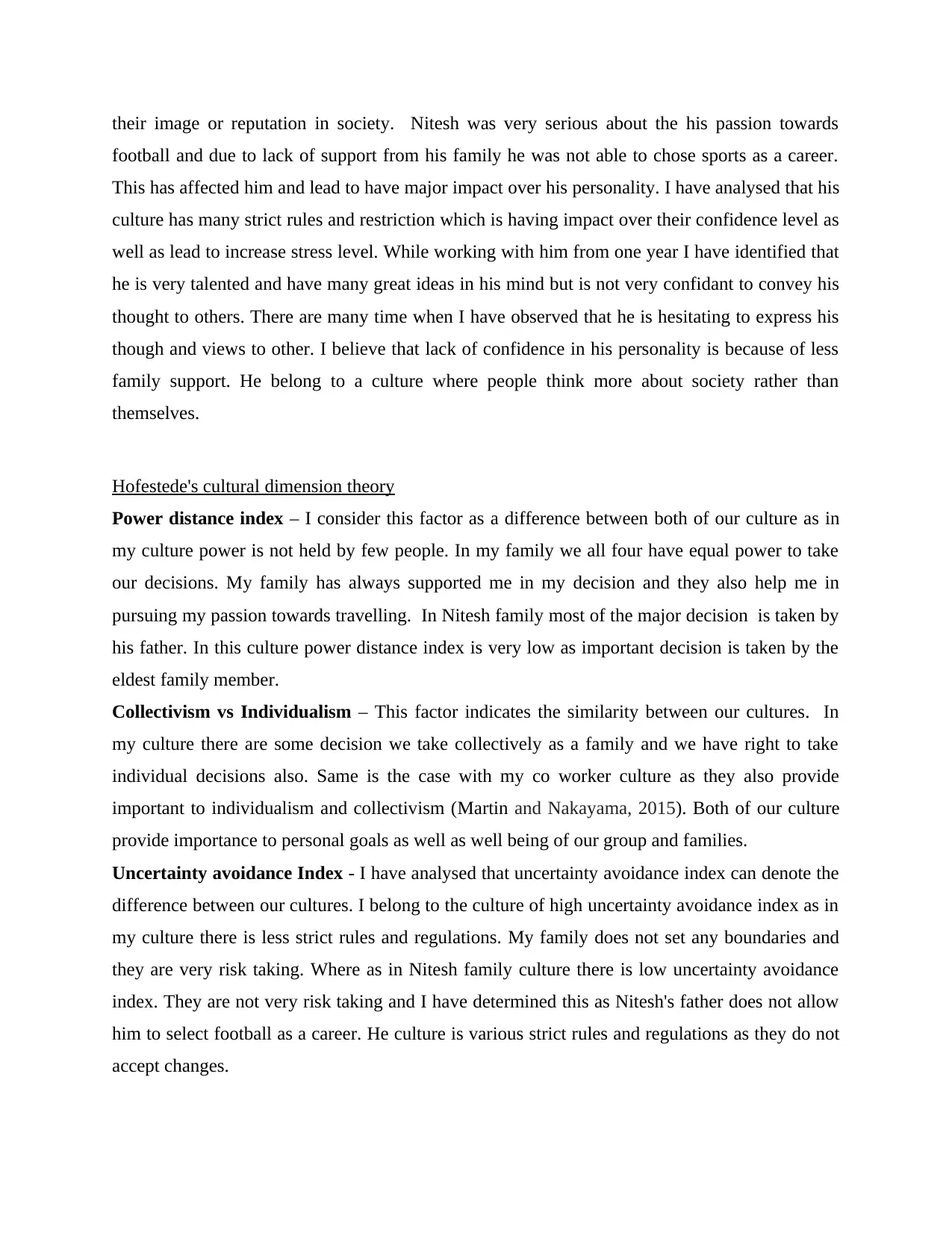
their image or reputation in society. Nitesh was very serious about the his passion towards
football and due to lack of support from his family he was not able to chose sports as a career.
This has affected him and lead to have major impact over his personality. I have analysed that his
culture has many strict rules and restriction which is having impact over their confidence level as
well as lead to increase stress level. While working with him from one year I have identified that
he is very talented and have many great ideas in his mind but is not very confidant to convey his
thought to others. There are many time when I have observed that he is hesitating to express his
though and views to other. I believe that lack of confidence in his personality is because of less
family support. He belong to a culture where people think more about society rather than
themselves.
Hofestede's cultural dimension theory
Power distance index – I consider this factor as a difference between both of our culture as in
my culture power is not held by few people. In my family we all four have equal power to take
our decisions. My family has always supported me in my decision and they also help me in
pursuing my passion towards travelling. In Nitesh family most of the major decision is taken by
his father. In this culture power distance index is very low as important decision is taken by the
eldest family member.
Collectivism vs Individualism – This factor indicates the similarity between our cultures. In
my culture there are some decision we take collectively as a family and we have right to take
individual decisions also. Same is the case with my co worker culture as they also provide
important to individualism and collectivism (Martin and Nakayama, 2015). Both of our culture
provide importance to personal goals as well as well being of our group and families.
Uncertainty avoidance Index - I have analysed that uncertainty avoidance index can denote the
difference between our cultures. I belong to the culture of high uncertainty avoidance index as in
my culture there is less strict rules and regulations. My family does not set any boundaries and
they are very risk taking. Where as in Nitesh family culture there is low uncertainty avoidance
index. They are not very risk taking and I have determined this as Nitesh's father does not allow
him to select football as a career. He culture is various strict rules and regulations as they do not
accept changes.
football and due to lack of support from his family he was not able to chose sports as a career.
This has affected him and lead to have major impact over his personality. I have analysed that his
culture has many strict rules and restriction which is having impact over their confidence level as
well as lead to increase stress level. While working with him from one year I have identified that
he is very talented and have many great ideas in his mind but is not very confidant to convey his
thought to others. There are many time when I have observed that he is hesitating to express his
though and views to other. I believe that lack of confidence in his personality is because of less
family support. He belong to a culture where people think more about society rather than
themselves.
Hofestede's cultural dimension theory
Power distance index – I consider this factor as a difference between both of our culture as in
my culture power is not held by few people. In my family we all four have equal power to take
our decisions. My family has always supported me in my decision and they also help me in
pursuing my passion towards travelling. In Nitesh family most of the major decision is taken by
his father. In this culture power distance index is very low as important decision is taken by the
eldest family member.
Collectivism vs Individualism – This factor indicates the similarity between our cultures. In
my culture there are some decision we take collectively as a family and we have right to take
individual decisions also. Same is the case with my co worker culture as they also provide
important to individualism and collectivism (Martin and Nakayama, 2015). Both of our culture
provide importance to personal goals as well as well being of our group and families.
Uncertainty avoidance Index - I have analysed that uncertainty avoidance index can denote the
difference between our cultures. I belong to the culture of high uncertainty avoidance index as in
my culture there is less strict rules and regulations. My family does not set any boundaries and
they are very risk taking. Where as in Nitesh family culture there is low uncertainty avoidance
index. They are not very risk taking and I have determined this as Nitesh's father does not allow
him to select football as a career. He culture is various strict rules and regulations as they do not
accept changes.
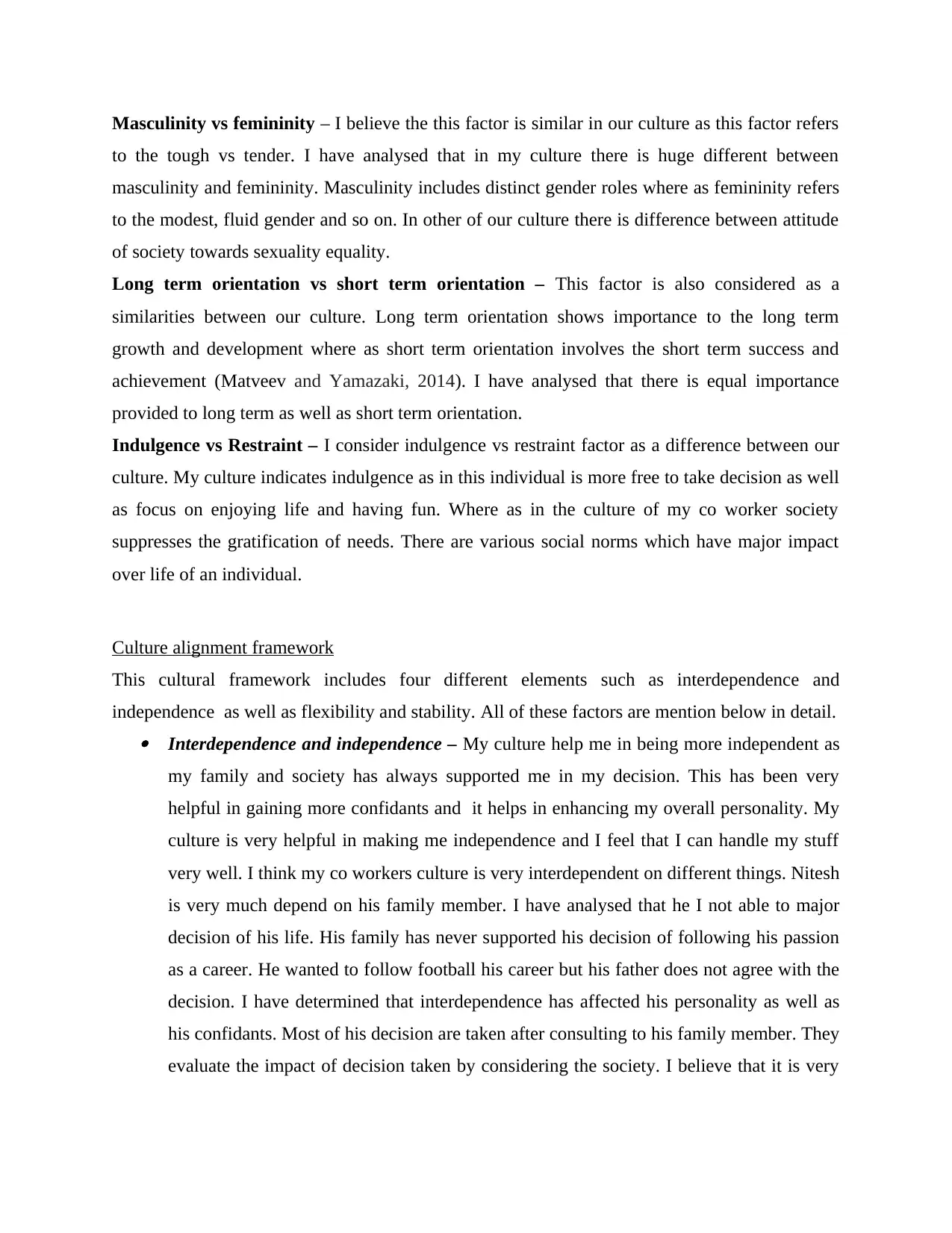
Masculinity vs femininity – I believe the this factor is similar in our culture as this factor refers
to the tough vs tender. I have analysed that in my culture there is huge different between
masculinity and femininity. Masculinity includes distinct gender roles where as femininity refers
to the modest, fluid gender and so on. In other of our culture there is difference between attitude
of society towards sexuality equality.
Long term orientation vs short term orientation – This factor is also considered as a
similarities between our culture. Long term orientation shows importance to the long term
growth and development where as short term orientation involves the short term success and
achievement (Matveev and Yamazaki, 2014). I have analysed that there is equal importance
provided to long term as well as short term orientation.
Indulgence vs Restraint – I consider indulgence vs restraint factor as a difference between our
culture. My culture indicates indulgence as in this individual is more free to take decision as well
as focus on enjoying life and having fun. Where as in the culture of my co worker society
suppresses the gratification of needs. There are various social norms which have major impact
over life of an individual.
Culture alignment framework
This cultural framework includes four different elements such as interdependence and
independence as well as flexibility and stability. All of these factors are mention below in detail. Interdependence and independence – My culture help me in being more independent as
my family and society has always supported me in my decision. This has been very
helpful in gaining more confidants and it helps in enhancing my overall personality. My
culture is very helpful in making me independence and I feel that I can handle my stuff
very well. I think my co workers culture is very interdependent on different things. Nitesh
is very much depend on his family member. I have analysed that he I not able to major
decision of his life. His family has never supported his decision of following his passion
as a career. He wanted to follow football his career but his father does not agree with the
decision. I have determined that interdependence has affected his personality as well as
his confidants. Most of his decision are taken after consulting to his family member. They
evaluate the impact of decision taken by considering the society. I believe that it is very
to the tough vs tender. I have analysed that in my culture there is huge different between
masculinity and femininity. Masculinity includes distinct gender roles where as femininity refers
to the modest, fluid gender and so on. In other of our culture there is difference between attitude
of society towards sexuality equality.
Long term orientation vs short term orientation – This factor is also considered as a
similarities between our culture. Long term orientation shows importance to the long term
growth and development where as short term orientation involves the short term success and
achievement (Matveev and Yamazaki, 2014). I have analysed that there is equal importance
provided to long term as well as short term orientation.
Indulgence vs Restraint – I consider indulgence vs restraint factor as a difference between our
culture. My culture indicates indulgence as in this individual is more free to take decision as well
as focus on enjoying life and having fun. Where as in the culture of my co worker society
suppresses the gratification of needs. There are various social norms which have major impact
over life of an individual.
Culture alignment framework
This cultural framework includes four different elements such as interdependence and
independence as well as flexibility and stability. All of these factors are mention below in detail. Interdependence and independence – My culture help me in being more independent as
my family and society has always supported me in my decision. This has been very
helpful in gaining more confidants and it helps in enhancing my overall personality. My
culture is very helpful in making me independence and I feel that I can handle my stuff
very well. I think my co workers culture is very interdependent on different things. Nitesh
is very much depend on his family member. I have analysed that he I not able to major
decision of his life. His family has never supported his decision of following his passion
as a career. He wanted to follow football his career but his father does not agree with the
decision. I have determined that interdependence has affected his personality as well as
his confidants. Most of his decision are taken after consulting to his family member. They
evaluate the impact of decision taken by considering the society. I believe that it is very
⊘ This is a preview!⊘
Do you want full access?
Subscribe today to unlock all pages.

Trusted by 1+ million students worldwide
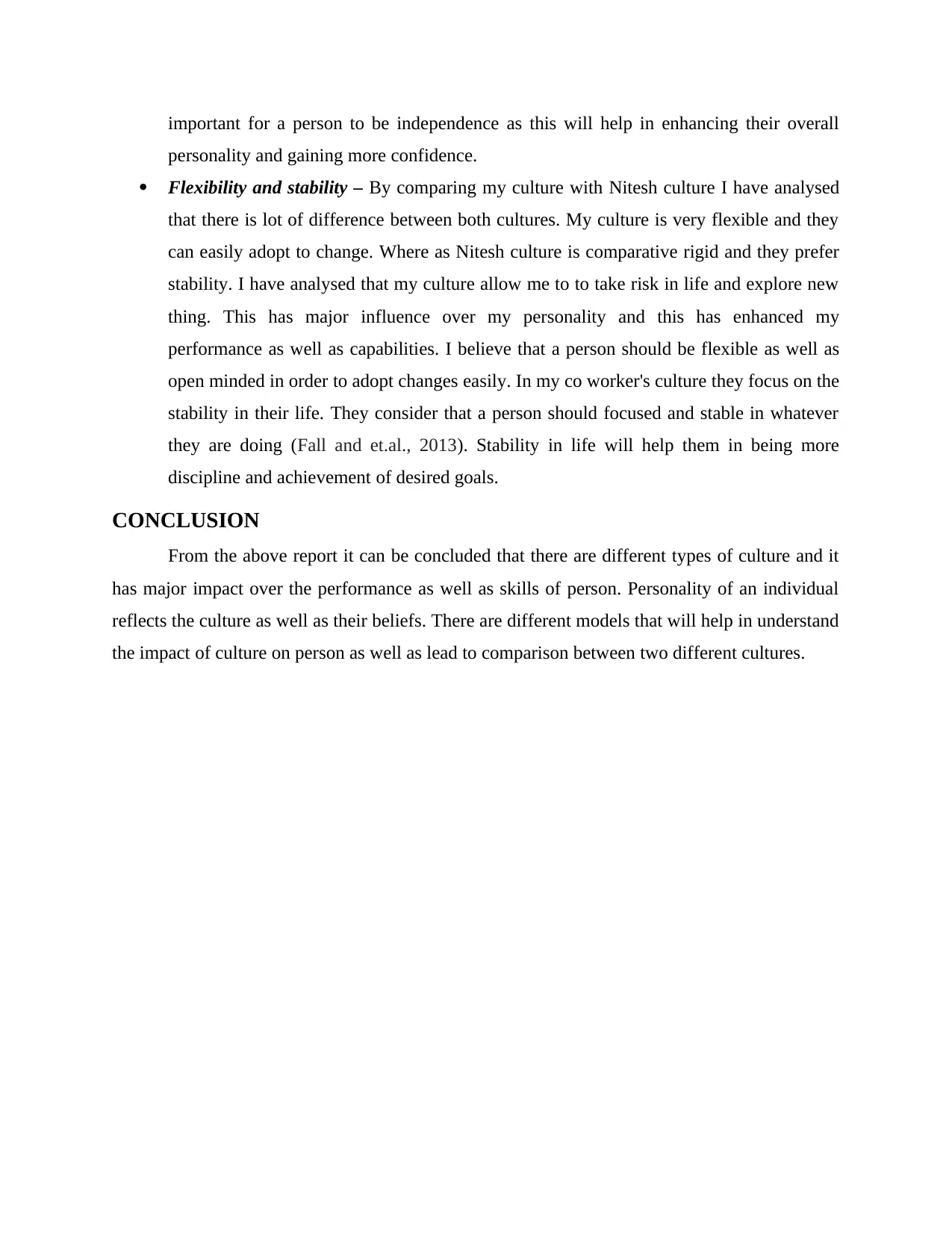
important for a person to be independence as this will help in enhancing their overall
personality and gaining more confidence.
Flexibility and stability – By comparing my culture with Nitesh culture I have analysed
that there is lot of difference between both cultures. My culture is very flexible and they
can easily adopt to change. Where as Nitesh culture is comparative rigid and they prefer
stability. I have analysed that my culture allow me to to take risk in life and explore new
thing. This has major influence over my personality and this has enhanced my
performance as well as capabilities. I believe that a person should be flexible as well as
open minded in order to adopt changes easily. In my co worker's culture they focus on the
stability in their life. They consider that a person should focused and stable in whatever
they are doing (Fall and et.al., 2013). Stability in life will help them in being more
discipline and achievement of desired goals.
CONCLUSION
From the above report it can be concluded that there are different types of culture and it
has major impact over the performance as well as skills of person. Personality of an individual
reflects the culture as well as their beliefs. There are different models that will help in understand
the impact of culture on person as well as lead to comparison between two different cultures.
personality and gaining more confidence.
Flexibility and stability – By comparing my culture with Nitesh culture I have analysed
that there is lot of difference between both cultures. My culture is very flexible and they
can easily adopt to change. Where as Nitesh culture is comparative rigid and they prefer
stability. I have analysed that my culture allow me to to take risk in life and explore new
thing. This has major influence over my personality and this has enhanced my
performance as well as capabilities. I believe that a person should be flexible as well as
open minded in order to adopt changes easily. In my co worker's culture they focus on the
stability in their life. They consider that a person should focused and stable in whatever
they are doing (Fall and et.al., 2013). Stability in life will help them in being more
discipline and achievement of desired goals.
CONCLUSION
From the above report it can be concluded that there are different types of culture and it
has major impact over the performance as well as skills of person. Personality of an individual
reflects the culture as well as their beliefs. There are different models that will help in understand
the impact of culture on person as well as lead to comparison between two different cultures.
Paraphrase This Document
Need a fresh take? Get an instant paraphrase of this document with our AI Paraphraser
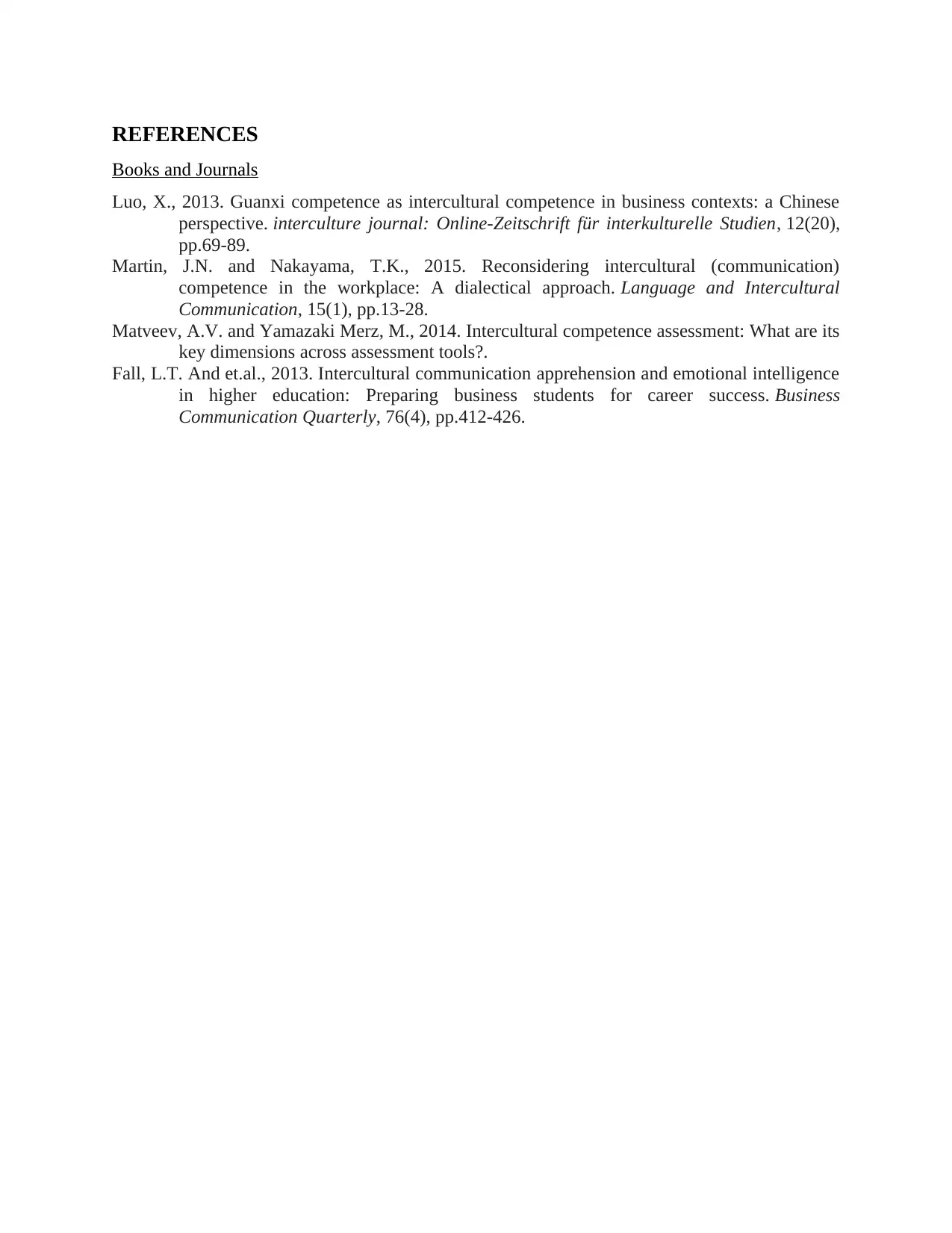
REFERENCES
Books and Journals
Luo, X., 2013. Guanxi competence as intercultural competence in business contexts: a Chinese
perspective. interculture journal: Online-Zeitschrift für interkulturelle Studien, 12(20),
pp.69-89.
Martin, J.N. and Nakayama, T.K., 2015. Reconsidering intercultural (communication)
competence in the workplace: A dialectical approach. Language and Intercultural
Communication, 15(1), pp.13-28.
Matveev, A.V. and Yamazaki Merz, M., 2014. Intercultural competence assessment: What are its
key dimensions across assessment tools?.
Fall, L.T. And et.al., 2013. Intercultural communication apprehension and emotional intelligence
in higher education: Preparing business students for career success. Business
Communication Quarterly, 76(4), pp.412-426.
Books and Journals
Luo, X., 2013. Guanxi competence as intercultural competence in business contexts: a Chinese
perspective. interculture journal: Online-Zeitschrift für interkulturelle Studien, 12(20),
pp.69-89.
Martin, J.N. and Nakayama, T.K., 2015. Reconsidering intercultural (communication)
competence in the workplace: A dialectical approach. Language and Intercultural
Communication, 15(1), pp.13-28.
Matveev, A.V. and Yamazaki Merz, M., 2014. Intercultural competence assessment: What are its
key dimensions across assessment tools?.
Fall, L.T. And et.al., 2013. Intercultural communication apprehension and emotional intelligence
in higher education: Preparing business students for career success. Business
Communication Quarterly, 76(4), pp.412-426.
1 out of 8
Related Documents
Your All-in-One AI-Powered Toolkit for Academic Success.
+13062052269
info@desklib.com
Available 24*7 on WhatsApp / Email
![[object Object]](/_next/static/media/star-bottom.7253800d.svg)
Unlock your academic potential
Copyright © 2020–2026 A2Z Services. All Rights Reserved. Developed and managed by ZUCOL.


